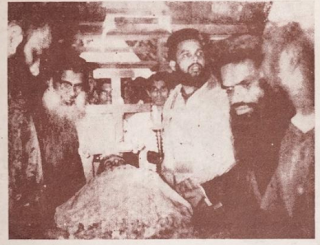The liturgical calendar of the Indian Orthodox Church commemorates the holy father St Ignatius- the third bishop of Antioch. Church historian Eusebius (~265-339 AD) mentions about the martyrdom of St. Ignatius thus:
“Report says that he (Ignatius) was sent from Syria to Rome
and became food for wild beasts on account of his testimony to Christ. And as
he made the journey through Asia under the strictest military surveillance, he
fortified the parishes in the various cities where he stopped by oral homilies
and exhortations, and warned them above all to be especially on their guard
against the heresies that were then beginning to prevail, and exhorted them to
hold fast to the tradition of the apostles. Moreover, he thought it necessary
to attest that tradition in writing, and to give it a fixed form for the sake
of greater security.” (Church history Book III, Chapter 36:3-4).
The tradition goes that when St Ignatius was a little boy,
the Lord Jesus Christ took him in His arms and said: “Unless you turn and
become as little children, you shall not enter into the Kingdom of Heaven” (St.
Matthew 18:3). St Ignatius was called “God-Bearer” (Theophoros), because he
bore God in his heart and prayed unceasingly to Him. He also had this name
because he was held in the arms of Christ, the incarnate Son of God. St
Ignatius was a disciple of Apostle-St John the Beloved.
In around AD 106, the emperor Trajan issued a decree that
the Christians should unite with the pagans in the worship of the pagan gods.
Death penalty was for those who disobeyed. Meanwhile in Antioch, Bishop
Ignatius openly confessed Christ, and taught people to scorn riches, and to
lead a virtuous life. The bishop’s untiring efforts did not long remain hidden
from the Church's persecutors. St Ignatius was soon arrested and led before
Trajan, who was then sojourning in Antioch. The emperor decided to send the
bishop to Rome to be thrown to the wild beasts and become a spectacle for the
people. St Ignatius joyfully accepted the sentence imposed upon him. In Rome,
St Ignatius got the crown of martyrdom when he was led into the arena where the
lions devoured him. An excerpt of conversation between Emperor Trajan and St. Ignatius (from the wor- The Martyrdom of Ignatius ANF Vol-I)
Trajan: And who is Theophorus?
Ignatius replied, He who has Christ within his breast.
Trajan said, Do you mean Him who was crucified under Pontius Pilate?
Ignatius replied, I mean Him who crucified my sin, with him who was the inventor of it, and who has condemned [and cast down] all the deceit and malice of the devil under the feet of those who carry Him in their heart.
Trajan said, Do you then carry within you Him that was crucified?
Ignatius replied, Truly so; for it is written, 'I will dwell in them, and walk in them.'
Then Trajan pronounced the sentence as follows: We command that Ignatius, who affirms that he carries about within him Him that was crucified, be bound by soldiers, and carried to the great Rome, there to be devoured by the beasts, for the gratification of the people.
When the holy martyr heard this sentence, he cried out with joy, I thank you, O Lord, that You have vouchsafed to honour me with a perfect love towards You, and have made me to be bound with iron chains, like Your Apostle Paul.
On the way to Rome St Ignatius visited several churches,
teaching and guiding the Christians there. He also wrote seven epistles: to the
churches of Ephesus, Magnesia, Tralles, Rome, Philadelphia, and Smyrna and one
to St Polycarp. The Christians in Rome met St Ignatius with profound sorrow.
Some of them hoped to prevent his execution, but St Ignatius implored them not
to do this. Kneeling down, he prayed together with the believers for the
Church, for love between the brethren, and for an end to the persecution
against Christians.
A glimpse of the trials faced by St Ignatius during this
journey is noted in his epistle to Romans:
“From Syria even unto Rome I fight with beasts, both by land
and sea, both by night and day, being bound to ten leopards, I mean a band of
soldiers, who, even when they receive benefits, show themselves all the
worse..…. May I enjoy the wild beasts that are prepared for me; and I pray they
may be found eager to rush upon me, which also I will entice to devour me
speedily, and not deal with me as with some, whom, out of fear, they have not
touched.”
St Ignatius further says: “All the pleasures of the world,
and all the kingdoms of this earth, shall profit me nothing. It is better for
me to die on behalf of Jesus Christ, than to reign over all the ends of the
earth.”
St John Chrysostom in his homily on St Ignatius- the
apostolic father, bishop, and martyr, said:
“For see, he (St Ignatius) presided over the Church among us
nobly, and with such carefulness as Christ desires. For that which Christ
declared to be the highest standard and rule of the Episcopal office, did this
man display by his deeds. For having heard Christ saying, the good shepherd
lays down his life for the sheep, with all courage he did lay it down for the
sheep.”
As we commemorate St. Ignatius Nurono today, let the
following teaching of his (inscribed in his letter to the Magnesians) guide our
conduct and let us imbibe it in our hearts: ‘It is fitting, then, not only to
be called Christians, but to be so in reality’.
By the prayers of our holy father among the saints- St.
Ignatius, Lord have mercy upon us and help us.
In Christ,
Rincy













